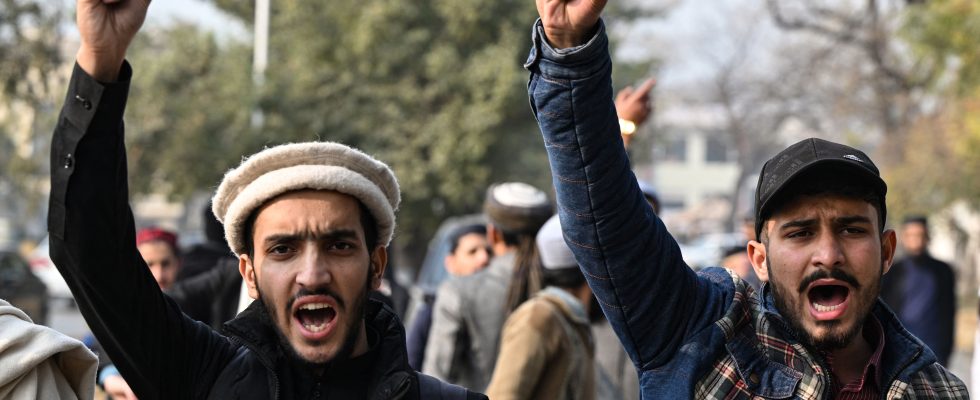Pakistan will not have waited to respond. Less than forty-eight hours after strikes carried out by Iran in the province of Balochistan, the Ministry of Foreign Affairs announced, Thursday, January 18, that it had carried out that very morning a “series of highly coordinated and specifically targeted precision military strikes ” against “terrorist hideouts” in the south of Iran, in the province of Sistan and Baluchestan.
On Tuesday January 16, Tehran carried out an air strike on Pakistani territory. This attack, which caused the death of two children, was deemed “totally unacceptable” and unjustified by Islamabad.
Only Muslim country with nuclear weapons
The unprecedented escalation between Iran and Pakistan, the only Muslim country with nuclear weapons, comes as the war rages between Hamas and Israel in the Gaza Strip. The conflict has stoked tensions across the Middle East. Yemen’s Houthi rebels, supported by Iran, have recently increased attacks on commercial ships in the Red Sea. Then, in recent days, there has been a worrying series of strikes and then counterattacks between these Yemeni rebels and the coalition led by the United States.
Tehran wants to show that it will retaliate forcefully against its enemies around the world. Before targeting Pakistan, Iran had already fired missiles on Tuesday in Syria and autonomous Iraqi Kurdistan at targets described as “terrorist” by the Islamic Republic and headquarters of “spies of the Zionist regime”. For Tehran, it was a response to the targeted assassinations carried out by Israel against the cadres of the “axis of resistance” (which brings together Iran’s allies in Lebanon, Syria, Iraq and Yemen). , as well as a deadly attack claimed by the Islamic State organization in Kerman, Iran, on January 3.
In Pakistan, Iran claims to have attacked the headquarters of Jaish Al-Adl, the organization which claimed responsibility for an attack on a police station in Sistan and Baluchistan, during which 11 Iranian police officers were killed last December. Several Baloch separatist groups operate in Iran and Pakistan and represent a source of tension between the two countries, which mutually accuse each other of serving as a rear base for rebels to carry out attacks on their territory.
Following the Iranian strikes, Pakistan recalled its ambassador to Tehran on Wednesday January 17 and prevented the return of the Iranian ambassador, who is currently in his country. Islamabad had warned of a response before actually retaliating on Thursday morning. “A number of terrorists were killed,” said the Pakistani government statement, while Tehran mentioned the death of nine people of “non-Iranian nationality”, according to official media.
Fear of wider conflict
The Pakistani counterattack is unprecedented and raises fears of a wider conflict in the region. “We are now facing a very dangerous and unpredictable situation,” warned Mosharraf Zaidi, a Pakistani writer and political analyst on X. Around the world, calls for restraint have multiplied: from Moscow to the European Union , passing through Beijing. Acting Prime Minister of Pakistan, Anwar ul-Haq Kakar, cut short his visit to Switzerland, where he was to participate in the 54th World Economic Forum in Davos.
“Pakistan’s retaliation appears to have been proportionate to Iran’s previous strike, and only targeted separatists and not Iranian security forces,” said Michael Kugelman, director of the South Asia Institute of Pakistan. Wilson Center in Washington. “The time has come to call on mediation to ensure that a sudden but increasingly dangerous crisis does not become uncontrollable,” believes this specialist, for whom Beijing, an ally of the two countries, is establishing itself as the intermediary of choice. China, which maintains privileged ties with Islamabad and Tehran, has also indicated that it is ready to “play a role” in easing tensions between Pakistan and Iran.
Iran and Pakistan also face internal pressures that could partly explain these attacks. A few weeks before the Pakistani legislative elections, scheduled for February 8, these strikes could benefit the Pakistan Muslim League (PML-N), the party of Nawaz Sharif, supported by the army, by temporarily calming the anger of the Pakistanis fueled by the repression against former Prime Minister Imran Khan, very popular in the country. As for Iran, it “wants to fight”, judges the writer Mosharraf Zaidi, who believes that a “revolutionary regime cannot survive [que s’il se trouve dans un] state of perpetual war.
.
